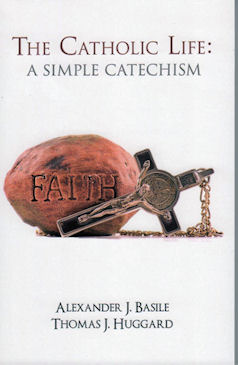
|
Posted
January 13, 2013
Book: The Catholic Life: A Simple Catechism Authors: Alexander J. Basile and Thomas J. Huggard St. Pauls. Staten Island. 2012. pp. 147 An Excerpt from the Book:
An Excerpt from the book: Parental Wisdom: the Church Fathers We usually associate the Apostles with the formation of the early Church. These men accompanied Jesus throughout his ministry and spread the message of Christianity far and wide after he had ascended into Heaven. But as the apostolic generation passed, there were still many questions about faith and doctrine that needed t obe defined. The writers and theologians who carried on the development of the Church are called the Church Fathers. The Apostolic Fathers were theologians who are closely connected to the apostles. They wrote during the latter part of the first century. As persecutions began against the Church, these writers defended Christianity. These authors were known as apologists. Their writings were directed towards Roman emperors and other pagan critics. With the Edict of Milan in 313 A.D. issued by Constantine, persecution of Christianity ended. The Church Fathers now focused on heresey (false teaching) that arose within the Church. Three geographical regions: Alexandria (Clement and Origen), Antioch (Diodore of Tarsus and John Chrysostom, and Western North Africa (Cyprian, Tertullian and Augustine). Tertullian (160-225) -- A convert to Christianity, Tertullian argued that Christianity posed no threat to the Roman Empire. He broke away from the Church when he joined the Montanist sect. He is referred to as the "father of Latin theology." Saint Hyppolytus (170-236) He wrote the important work The Apostolic Tradition that served as the source for the Second Eucharistic Prayer (Roman Missal, 1970) which was part of the Vatican II changes. Saint Ignatius (50-107) Tradition states taht Ignatius had direct contact with Saint Peter and Saint John. He wrote seven epistles and served as the third Bishop of Antioch. Because of his connection with these apostles he is called an apostolic father. Ignatius was martyred in Rome. Saint Polycarp (69-155) Also known as an apostolic father, Polycarp defended the Church against many heresies. He was captured and told to deny his faith. When he refused, he was burned alive. When Polycarp remained untouched by the fire, the saint was finally killed with the sword. Saint Irenaeus (130-200) Saint Irenaeus was a disciple of Polycarp. He wanted all Christians to understand the tradition of the Church. His writing carefully dissected each heresey before proving them incorrect. Irenaeus had served as a bishop of Lyons for close to 25 years before he was martyred. Origen (185-254) This theologian came from the school of Alexandria. Origen is known for his exegetical (biblical analysis) work asa scholar and as one of the most prolific writers in the Eastern Church. Saint Ambrose (339-397) As a lawyer and catechumen, people in the Church recognized the face and wisdom of Ambrose. The people of Milan wanted Ambrose to be their bishop. He excommunicated the Emperor Theodosius for slaughtering 700 people. Ambrose forced Theodosius to confess and repent his sin like any commoner. Ambrose is also known for his fight against the Arian heresy and for his oratorical skills. Table of Contents: 1. The Trinity 2. Living the moral life 3. His-Story 4. The bride of Christ 5. In communion 6. Positive living |
|
